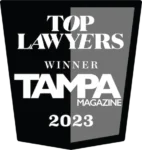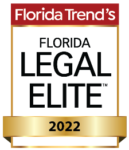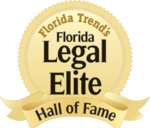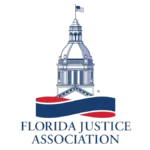
by Dale Swope
Homeowner’s insurance covered injuries resulting from the insured front seat passenger’s horseplay of repeatedly trying to grab the steering wheel of a moving car. The driver’s efforts to stop the passenger from grabbing the steering wheel which caused the vehicle to hit a wall and injure rear seat passengers, did not amount to the “use” of a motor vehicle so as to trigger the auto exclusion. Sunshine State Ins. Co. v. Jones, ____ So.3d ____, 37 FLW D167a (Fla. 4th DCA Jan. 18, 2012).
Assault On Treating Physicians Goes Too Far
All-out attacks on treating doctors have become the typical fare for many defense attorneys. Defense counsel in Pedro v. Baber, ____ So. 3d ____, 37 FLW D550a (Fla. 2d DCA Mar. 7, 2012), began the trend first by calling Plaintiff Baber’s orthopedic surgeon a “personal injury doctor,” then droned on about the doctor’s acceptance of letters of protection. Defense counsel described the doctor’s charges as inflated and claimed that the surgery he performed did not help Baber.
That theme was continued when the CME, Dr. Knezevich, testified that Barber’s temporary sprains did not require surgery. Dr. Knezevich assigned Baber an impairment rating related strictly to the surgery, but insisted the surgery was not related to the crash and specifically disagreed with the decision to do surgery. Apparently the defense hoped that by avoiding the question of whether Baber needed surgery at all, it could avoid the Stuart v. Hertz instruction that can be a game changer in these circumstances. The trial court disagreed, gave the instruction, and the jury found negligence, causation, and awarded significant damages in Pedro’s favor.
Affirming, the appellate Court condemned the defense’s attempt to shift blame for Baber’s damages to a treating doctor and compound the error by objecting to a Stuart instruction. When determining whether certain treatment is necessary, the trial court and jury consider the perspective of the injured party and the right of a patient to depend on the recommendations of a treating physician. A Stuart v. Hertz charge is appropriate when the defense offers evidence that the treatment provided by a doctor to the injured party has made, or could make, things worse. “[E]ven though the defendants ‘carefully avoided the term “malpractice” during trial,’ the doctor’s testimony and the defendants’ closing argument ‘clearly placed this issue before the jury.’”Id. (quoting Nason v. Shafranski, 33 So. 3d 117, 121 (Fla. 4th DCA 2010)).
FIGA And Attorneys’ Fees
Resolving conflict between DCA’s regarding whether FIGA is responsible for paying a plaintiff’s attorney’s fees in a first-party claim, the Florida Supreme Court held that section631.54(3), Florida Statutes, describes the “covered claims” that FIGA is required to pay and that the payment of attorney’s fees is not one of them. Petty v. Florida Ins. Guar.Ass’n, ____ So. 3d ____, 37 FLW S34a (Fla. Jan. 19, 2012). It disapproved the Third District’s contrary decision in Florida Insurance Guaranty Association v. Soto, 979 So. 2d 964 (Fla. 3d DCA 2008).
Out-of-State Policy Can Prompt Threshold Defense
Because many states, like Florida, special protect drivers of cars with certain minimum coverage, policies sometimes incorporate a “chameleon” provision which says, essentially, that if you have an out-of-state wreck, your policy will meet the minimum requirements of the state where the accident occurred. The pertinent language of the Illinois policy in Jiminez v. Faccone, ____ So. 3d ____, 37 FLW D325a (Fla. 2d DCA Feb. 8, 2012),was,“…the policy will be interpreted to give the coverage required by law.”
The court determined that because Ms. Jimenez had moved to Florida two weeks earlier, and was actually residing here at the time of the wreck, she was required to have PIP/PD under our statutory scheme. Because of that requirement, the language of Jiminez’s Illinois policy created compliance with Florida’s requirement of no-fault coverage, entitling Jiminez to the protection of the permanency threshold defense.
The court also reversed an SJ based on the rear-end liability presumption because of factual discrepancies about whether Faccone’s vehicle was stopped illegally in the roadway without proper illumination when Jiminez struck it from the rear at night. See McGill v. Martin Perez, Dion’s Nursery & Transp. Servs., Inc., 59 So. 3d 388(Fla. 2d DCA 2011); Itiat v. Foskey, 28 So.3d 140 (Fla. 1st DCA 2010).
Are Wrongful Death Survivors Immune From Sanctions Under Proposals For Settlement?
The Fifth District seems to say so in Kadlecik v. Haim, et al., ____ So. 3d ____, 37 FLW D430e (Fla. 5th DCA Feb. 17, 2012). Kadlecik was his late wife’s personal representative and sole survivor. He sued several defendants for medical malpractice, settled with one, and rejected the settlement proposals served by others. The successful defendants obtained a significant award of fees against the estate and hoped to enforce it from the proceeds of the earlier settlement, but were frustrated by Mr. Kadlecik’s strategic decision to “allocate” the entire recovery to his survivor’s claim rather than to the estate.
The defendants then sought to enforce the fee award against Mr. Kadlecik personally, since he was both the PR and the sole survivor. The opinion was not entirely clear whether these theories were based on mismanagement of estate assets, or just based on the survivor being the actual party in interest for both the settlement and the unsuccessful suit. But it was very clear that whatever the theory, the result was the same: neither a PR nor a survivor is liable for PFS fees charged against the estate.
Now, everyone is happy that the widower who lost his wife was at least able to keep the full settlement made with the hospital. How could you not be?
But at the same time, it is difficult to ignore the blatant unfairness to the defendants of a rule that makes them vulnerable to pay fees if they (or their jerky insurance companies) refuse an offer for less than the value of the case, while at the same time preventing them from recovering fees if the plaintiff refuses an offer for 25% more than the case is worth.
The court seemed to accept this as a type of legal wormhole formed by the interface of the Wrongful Death Act, which statutorily appoints the PR as agent to bring or settle claims on behalf of the survivors, and the PFS statute. But it does not seem like it is.
Before the insurance lobbyists start their search for sponsors for yet another blunderbuss “glitch bill” that eliminates the rights of victims and consumers with unfailingly overbroad language, we can probably find the solution to this narrow conundrum in the existing PFS rule, Florida Rule of Civil Procedure 1.442. This rule permits PFS’s to state their applicability to specific “claims.”
It seems logical that if a proposal were served to a litigation agent like a PR, offering a specific amount for the individual survivor’s claim, the result would be the opposite. The sloppiness here was not in the wording of the statute or rule, but in the wording of the proposals served by the defendants.
It Is Permissible To Make A PFS Only To The Active, And Not The Passive, Defendant
The defendant driver rejected a proposal to settle for about one fourth the value of the claim against him. He then convinced the trial judge that he should not have to pay fees since a settlement with him would not have ended the entire case, and instead could increase the possibility of trial since it would have allowed the plaintiff to avoid starvation while awaiting his turn on the docket.
If you weaken an insurance company’s inherent power to economically crush all who deign to go against it in litigation, how can we ever call our justice system fair or efficient, right?
That ruling was easily rejected by the Second District in McGregor v. Molnar, ____ So. 3d ____, 37 FLW D432a (Fla. 2d DCA Feb. 17, 2012), in an opinion that refreshingly harkened back to the Dvorak v. Friday’s doctrine that PFS decisions really should not be difficult to reach. You should simply need a calculator with fresh batteries to see if the judgment obtained was more than 125% of the proposal. Unless there was actual bad faith in the proposal, which is very strictly defined, your work is done.
The court also confirmed that any concerns about the offer not ending the litigation, or decreasing the court’s workload, are not factors to be considered in determining the amount of the award, in case anybody had any big ideas of trying that next time around.
Second DCA’S Code Blue Revives Coding Opinion
Substituting a new opinion, the Second District in State Farm Mutual Automobile Insurance Co. v. Bowling, ____ So. 3d ____, 37 FLW D379a (Fla. 2d DCA Feb. 10, 2012), granted Bowling’s motion for clarification in part and ordered a new trial on damages. State Farm appealed the final judgment in favor of Bowling, its insured under a UM policy. Finding the trial court had abused its discretion in excluding State Farm’s expert in medical billing and coding, Debra Pacha, the appellate court stated that Pacha had sufficient training and education to opine whether the bills submitted by Bowling’s medical providers “accurately reflect the care documented in the medical records of those same providers,” but not whether the medical care provided was reasonable.
Concurring in part and dissenting in part, Judge Crenshaw recognized Pacha’s testimony as collateral and warned that State Farm’s insinuation that Bowling’s medical providers committed billing fraud would shift the focus of the trial and prejudice Bowling. She also noted that a jury does not require an expert’s assistance to compare billing entries to the treatment provided.
Accident Report Privilege Strictly Applies To Statements of Witnesses Who Were Actually Involved In Crash
Erroneous application of the accident report privilege led to a reversal and remand for new trial in Sottilaro v. Figueroa, ____ So. 3d ____, 37 FLW D330a (Fla. 2d DCA Feb. 8, 2012).The trial court denied the impeachment of a witness with his prior inconsistent statement given to law enforcement as part of a traffic fatality report. As the court indicated, the accident report privilege of section 316.066(5), Florida Statutes (2010), applies only to persons compelled to make a report under the statutes, namely the driver, owner, or occupant of a vehicle involved in the crash. Statements of witnesses not involved in the accident are not protected.
Defendant’s Medical Records Are Not Immune From Discovery
On certiorari review, the defendant, McEnany, was required to produce two medical records that would show whether he had a prescription for Ritalin on the date of the accident. McEnany v. Ryan, ____So.3d ___, 37 FLW D230a (Fla. 4th DCA Jan. 25, 2012).
No Settlement When Release Terms Don’t Conform To Offer
The plaintiff offers to settle if the insurer coughs up the money and accompanies it with a release meeting sensible, clearly stated terms. The carrier sends the check and says,“‘We accept, and we will work with you to hammer out the ‘details’ of the release.”
That is not an enforceable settlement, unless you want to disregard the entire body of law related to unilateral offers that require performance, not just a promise to perform, for acceptance. Offers requiring performance have to be met with mirror image acceptance, as we all learned in law school.
Just promising your rich uncle that you will lay off the booze and cigars does not cut it, when he required you to actually do it. Remember?
So yet another trial judge got reversed recently, trying to apply the “substantial performance” doctrine (which applies to the performance or breach of an already existing contract) to an issue of offer and acceptance. Trout v. Apicella, ___ So.3d ____, 37 FLW D245a (Fla. 5th DCA Jan. 27, 2012).
Farm Tractor Gains Traction As A Dangerous Instrumentality
The Florida Legislature, in section 316.003(12), Florida Statutes (2004), defined a farm tractor as “Any motor vehicle designed and used primarily as a farm implement for drawing plows, mowing machines, and other implements of husbandry.” Considering the speed, weight, and mechanism of farm tractors, their negligent use, even when operated on private property or state roads or other public areas, is “peculiarly dangerous” to others and can lead to serious injuries. Therefore, a farm tractor is a dangerous instrumentality in Florida.Rippy v. Shepard, ____ So. 3d ____, 37 FLW S31a (Fla. Jan. 19, 2012).
Defense Has A High Burden To Prove That Plaintiff’s Claim Should Be Dismissed For Fraud On The Court
In Chacha v. Transport USA, Inc, 37 FLW D342b (Fla. 4th DCA Feb. 8, 2012), the court reversed the trial court’s dismissal with prejudice of the plaintiff’s case and remanded for a new trial. Chacha apparently failed to disclose back pain complaints made to another physician prior to the collision giving rise to his lawsuit. The trial court did not, and presumably would not, make written findings that this amounted to clear and convincing evidence that he had devised a deliberate scheme to undermine the judicial process. Dismissal for fraud, of course, is only suitable when “the plaintiff has committed ‘a fraud on the court which permeates the entire proceedings.’” McKnight v. Evancheck, 907 So. 2d 699, 700 (Fla. 4th DCA 2005).
What happens if the Defendant is found to have committed the same thing? Not much. A default, sure, but the Defendant is generally still permitted to take part in the trial and argue about causation and the amount of damages, which in most trials, is the heart of the case anyway.





